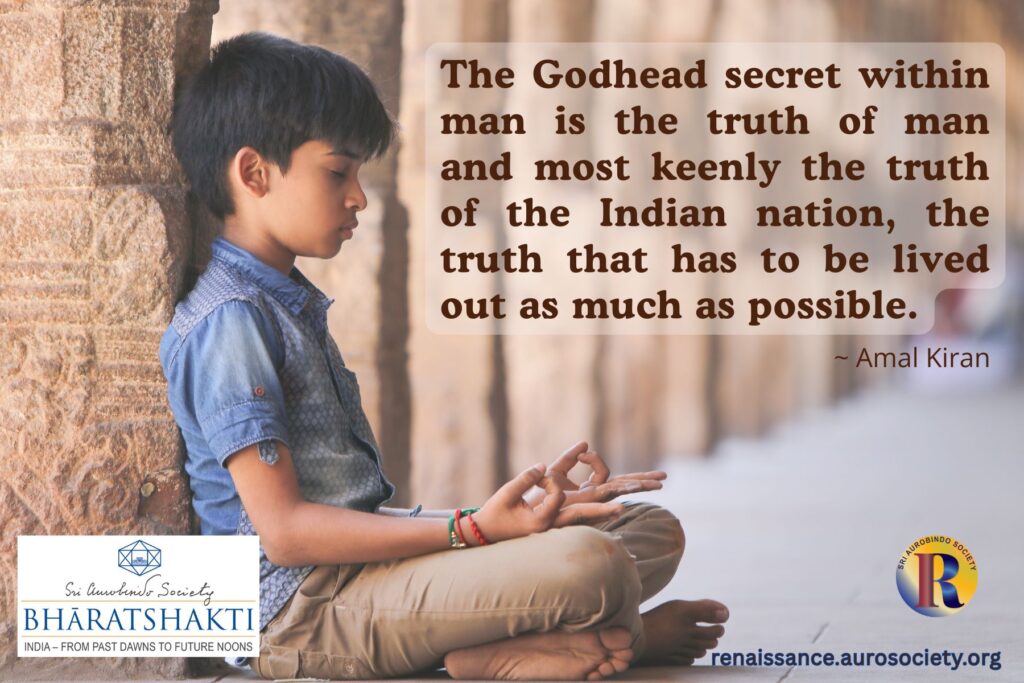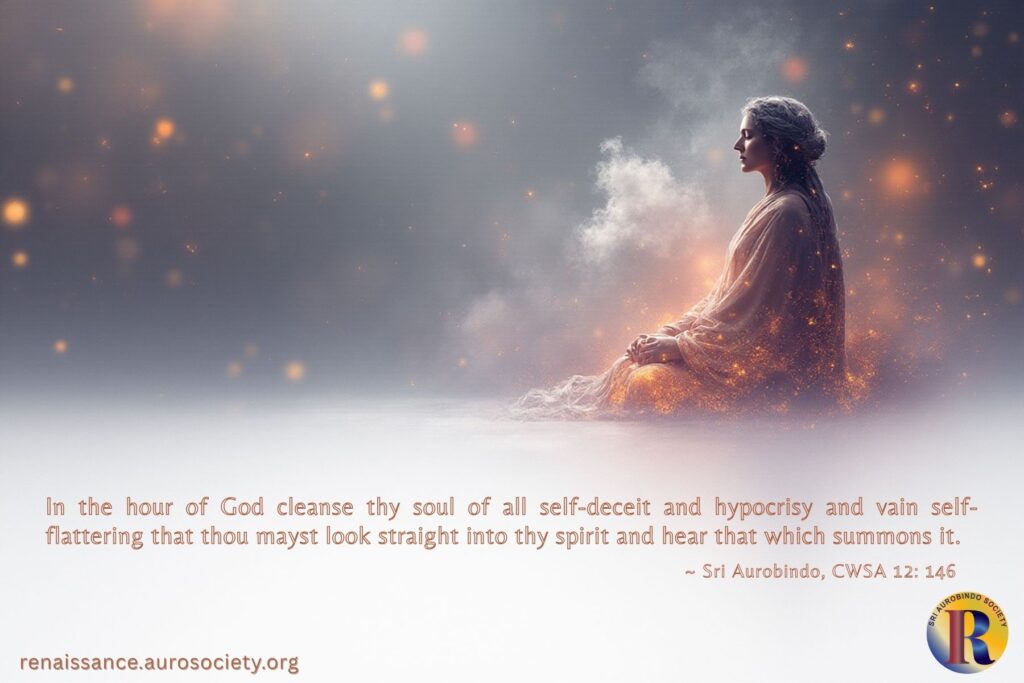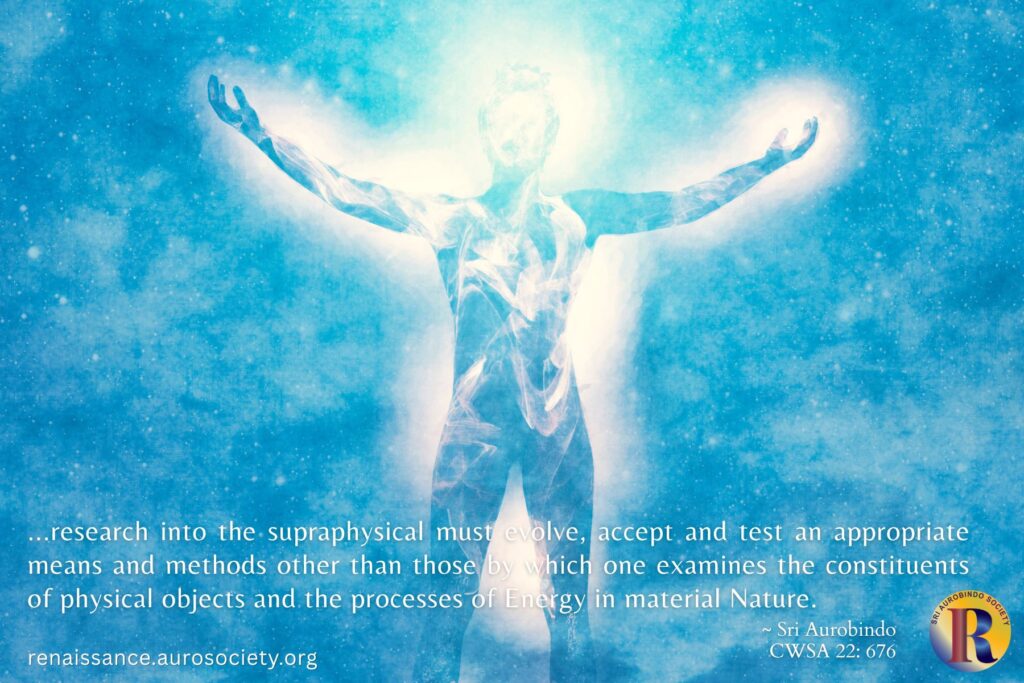Volume V, Issue 1
Author: Sri Aurobindo
Editor’s note: We feature a long excerpt from one of Sri Aurobindo’s essays from his volume Essays on the Gita. He presents a deeper psycho-spiritual understanding of Daivic and Asuric natures as described in Chapter 16 of the Bhagavad Gita. He further connects it with the ancient symbolism found in the Veda and speaks of the evolution of the soul in Nature as an adventure in its journey to the Divine.
We have made a few formatting changes for the purpose of virtual reading. Also, we have added a few sub-headings for easier flow in the digital presentation.

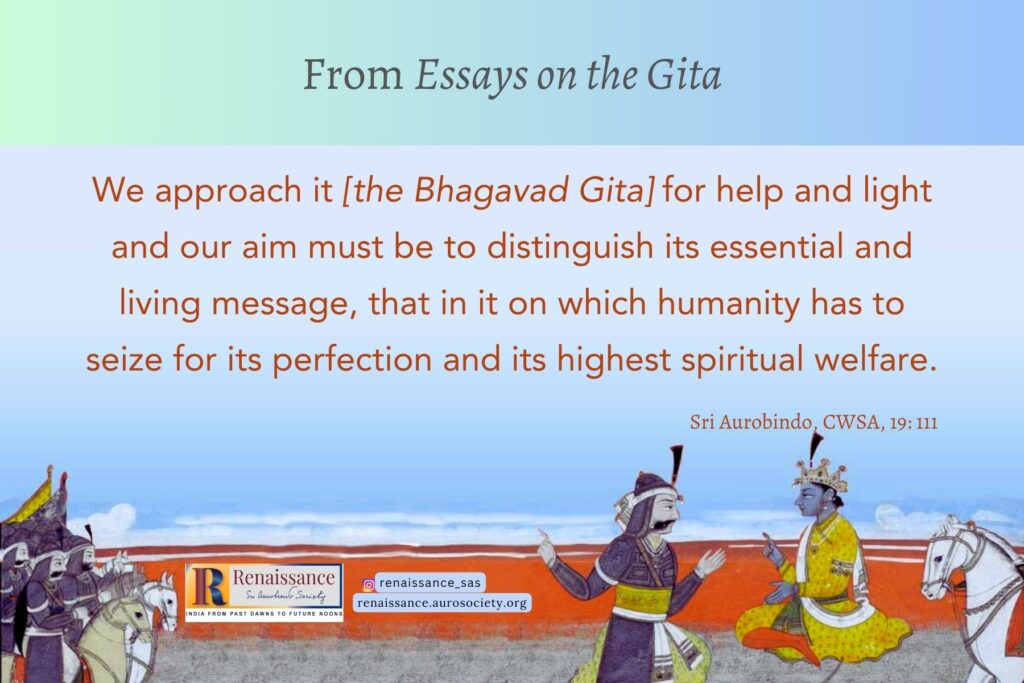
* * *
. . . the Deva is capable of a high self-transforming sattwic action, the Asura incapable.
~ Sri Aurobindo, CWSA, Vol. 19, p. 469
The general nature of all human beings is the same, it is a mixture of the three gunas; it would seem then that in all there must be the capacity to develop and strengthen the sattwic element and turn it upward towards the heights of the divine transformation.
That our ordinary turn is actually towards making our reason and will the servants of our rajasic or tamasic egoism, the ministers of our restless and ill-balanced kinetic desire or our self-indulgent indolence and static inertia, can only be, one would imagine, a temporary characteristic of our undeveloped spiritual being, a rawness of its imperfect evolution and must disappear when our consciousness rises in the spiritual scale.
But we actually see that men, at least men above a certain level, fall very largely into two classes, those who have a dominant force of sattwic nature turned towards knowledge, self-control, beneficence, perfection and those who have a dominant force of rajasic nature turned towards egoistic greatness, satisfaction of desire, the indulgence of their own strong will and personality which they seek to impose on the world, not for the service of man or God, but for their own pride, glory and pleasure. These are the human representatives of the Devas and Danavas or Asuras, the Gods and the Titans.
This distinction is a very ancient one in Indian religious symbolism.
The fundamental idea of the Rig Veda is a struggle between the Gods and their dark opponents, between the Masters of Light, sons of Infinity, and the children of Division and Night, a battle in which man takes part and which is reflected in all his inner life and action.
This was also a fundamental principle of the religion of Zoroaster. The same idea is prominent in later literature.
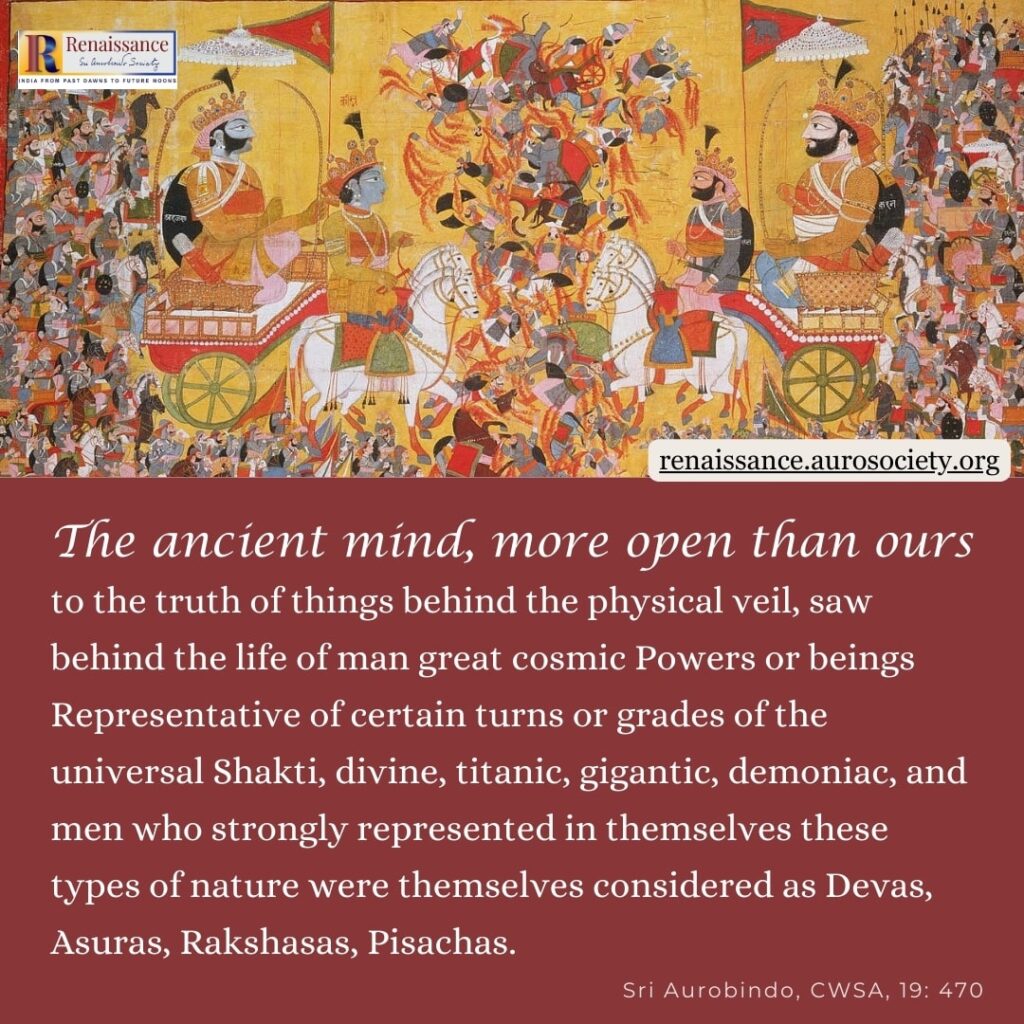
The Ramayana is in its ethical intention the parable of an enormous conflict between the Deva in human form and the incarnate Rakshasa, between the representative of a high culture and Dharma and a huge unbridled force and gigantic civilisation of the exaggerated Ego.
The Mahabharata, of which the Gita is a section, takes for its subject a lifelong clash between human Devas and Asuras, the men of power, sons of the Gods, who are governed by the light of a high ethical Dharma and others who are embodied Titans, the men of power who are out for the service of their intellectual, vital and physical ego.
The ancient mind, more open than ours to the truth of things behind the physical veil, saw behind the life of man great cosmic Powers or beings representative of certain turns or grades of the universal Shakti, divine, titanic, gigantic, demoniac, and men who strongly represented in themselves these types of nature were themselves considered as Devas, Asuras, Rakshasas, Pisachas. The Gita for its own purposes takes up this distinction and develops the difference between these two kinds of beings, dvau bhūtasargau […]
READ:
The Angirasa Legend in the Veda
Distinction not rigidly applicable
The distinction between the Deva and the Asura is not comprehensive of all humanity, not rigidly applicable to all its individuals, neither is it sharp and definite in all stages of the moral or spiritual history of the race or in all phases of the individual evolution.
The tamasic man who makes so large a part of the whole, falls into neither category as it is here described, though he may have both elements in him in a low degree and for the most part serves tepidly the lower qualities. The normal man is ordinarily a mixture; but one or the other tendency is more pronounced, tends to make him predominantly rajaso-tamasic or sattwo-rajasic and can be said to be preparing him for either culmination, for the divine clarity or the titanic turbulence.
For here what is in question is a certain culmination in the evolution of the qualitative nature, as will be evident from the descriptions given in the text. On one side there can be a sublimation of the sattwic quality, the culmination or manifestation of the unborn Deva, on the other a sublimation of the rajasic turn of the soul in nature, the entire birth of the Asura.
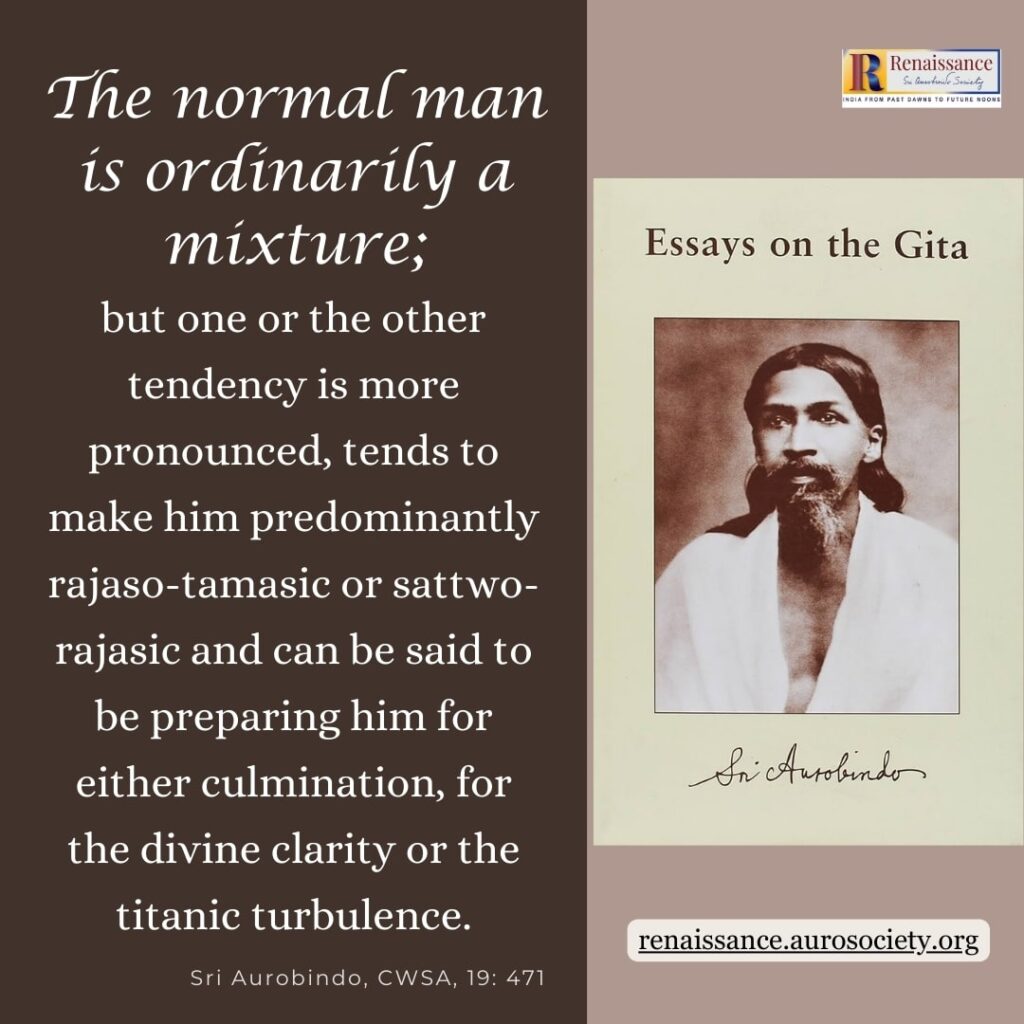
The one leads towards that movement of liberation on which the Gita is about to lay stress; it makes possible a high self-exceeding of the sattwa quality and a transformation into the likeness of the divine being, vimokṣāya. The other leads away from that universal potentiality and precipitates towards an exaggeration of our bondage to the ego. This is the point of the distinction.
The Deva Nature
The Deva nature is distinguished by an acme of the sattwic habits and qualities; self-control, sacrifice, the religious habit, cleanness and purity, candour and straightforwardness, truth, calm and self-denial, compassion to all beings, modesty, gentleness, forgivingness, patience, steadfastness, a deep sweet and serious freedom from all restlessness, levity and inconstancy are its native attributes.
The Asuric qualities, wrath, greed, cunning, treachery, wilful doing of injury to others, pride and arrogance and excessive self-esteem have no place in its composition. But its gentleness and self-denial and self-control are free too from all weakness: it has energy and soul force, strong resolution, the fearlessness of the soul that lives in the right and according to the truth as well as its harmlessness, tejaḥ, abhayam, dhṛtiḥ, ahiṁsā, satyam.
The whole being, the whole temperament is integrally pure; there is a seeking for knowledge and a calm and fixed abiding in knowledge. This is the wealth, the plenitude of the man born into the Deva nature.
The Asuric Nature
The Asuric nature has too its wealth, its plenitude of force, but it is of a very different, a powerful and evil kind. Asuric men have no true knowledge of the way of action or the way of abstention, the fulfilling or the holding in of the nature. Truth is not in them, nor clean doing, nor faithful observance.
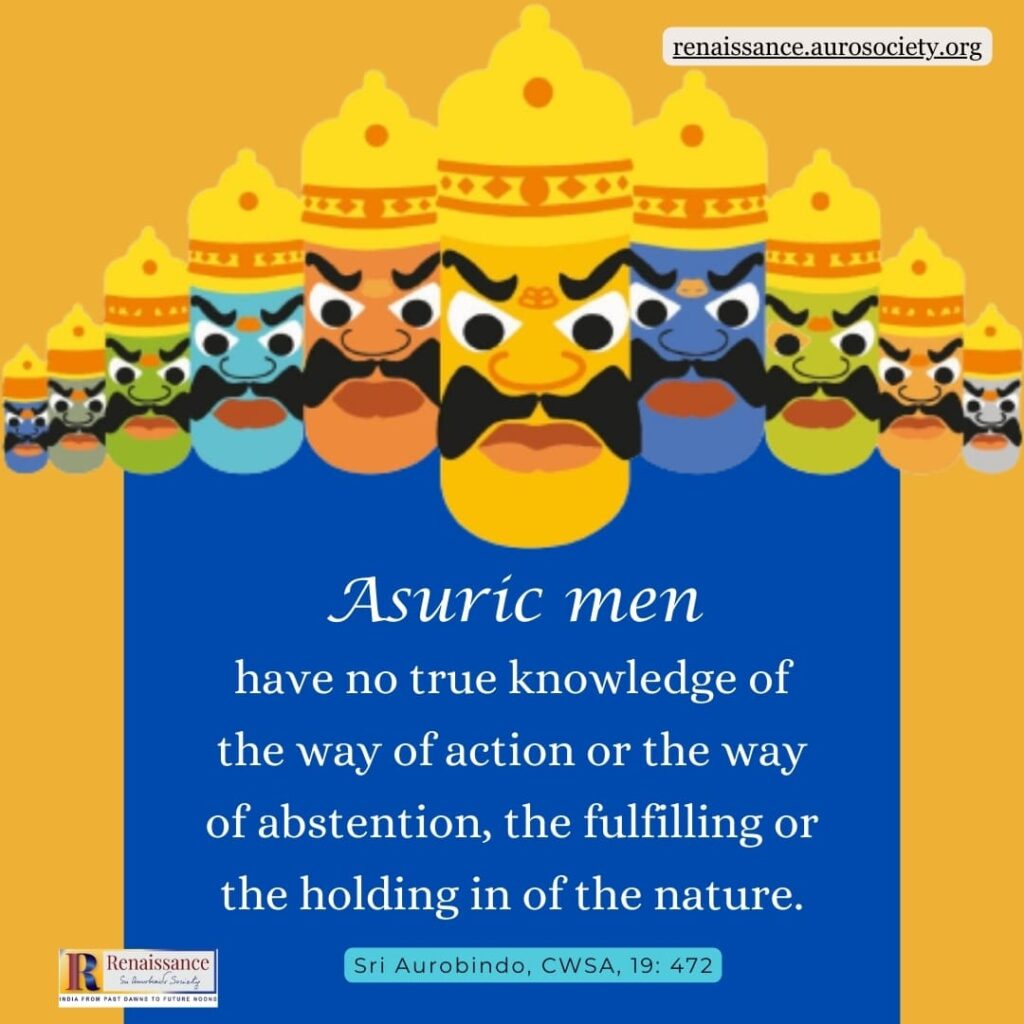
They see naturally in the world nothing but a huge play of the satisfaction of self; theirs is a world with Desire for its cause and seed and governing force and law, a world of Chance, a world devoid of just relation and linked Karma, a world without God, not true, not founded in Truth.
Whatever better intellectual or higher religious dogma they may possess, this alone is the true creed of their mind and will in action; they follow always the cult of Desire and Ego. On that way of seeing life they lean in reality and by its falsehood they ruin their souls and their reason.
The Asuric man becomes the centre or instrument of a fierce, Titanic, violent action, a power of destruction in the world, a fount of injury and evil.
Arrogant, full of self-esteem and the drunkenness of their pride, these misguided souls delude themselves, persist in false and obstinate aims and pursue the fixed impure resolution of their longings. They imagine that desire and enjoyment are all the aim of life and in their inordinate and insatiable pursuit of it they are the prey of a devouring, a measurelessly unceasing care and thought and endeavour and anxiety till the moment of their death.
Bound by a hundred bonds, devoured by wrath and lust, unweariedly occupied in amassing unjust gains which may serve their enjoyment and the satisfaction of their craving, always they think,
“Today I have gained this object of desire, tomorrow I shall have that other; today I have so much wealth, more I will get tomorrow. I have killed this my enemy, the rest too I will kill. I am a lord and king of men, I am perfect, accomplished, strong, happy, fortunate, a privileged enjoyer of the world; I am wealthy, I am of high birth; who is there like unto me? I will sacrifice, I will give, I will enjoy.”
Thus occupied by many egoistic ideas, deluded, doing works, but doing them wrongly, acting mightily, but for themselves, for desire, for enjoyment, not for God in themselves and God in man, they fall into the unclean hell of their own evil. They sacrifice and give, but from a self-regarding ostentation, from vanity and with a stiff and foolish pride.
In the egoism of their strength and power, in the violence of their wrath and arrogance they hate, despise and belittle the God hidden in themselves and the God in man.
And because they have this proud hatred and contempt of good and of God, because they are cruel and evil, the Divine casts them down continually into more and more Asuric births. Not seeking him, they find him not, and at last, losing the way to him altogether, sink down into the lowest status of soul-nature, adhamāṁ gatim.
Distinction must not be pressed too far
This graphic description, even giving its entire value to the distinction it implies, must not be pressed to carry more in it than it means.
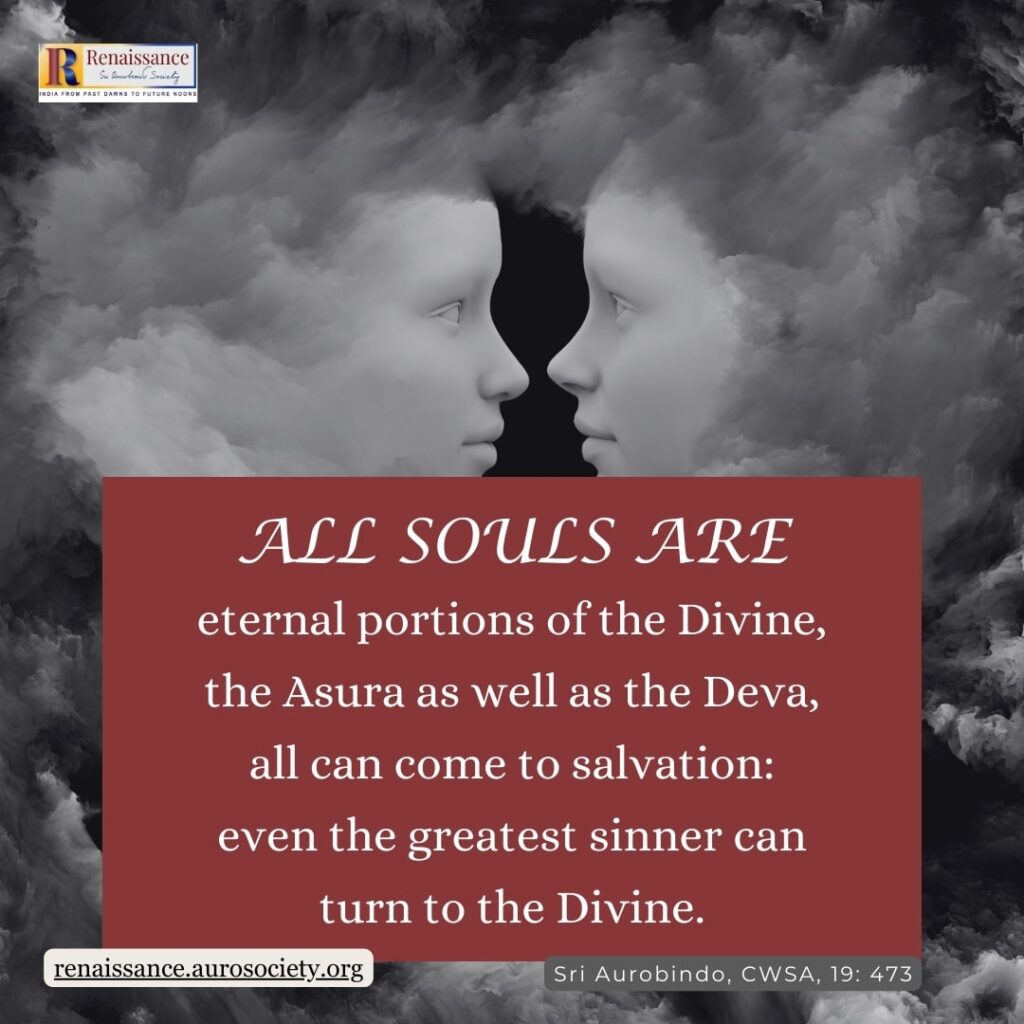
When it is said that there are two creations of beings in this material world, Deva and Asura, it is not meant that human souls are so created by God from the beginning each with its own inevitable career in Nature, nor is it meant that there is a rigid spiritual predestination and those rejected from the beginning by the Divine are blinded by him so that they may be thrust down to eternal perdition and the impurity of Hell.
All souls are eternal portions of the Divine, the Asura as well as the Deva, all can come to salvation: even the greatest sinner can turn to the Divine.
But the evolution of the soul in Nature is an adventure of which Swabhava and the Karma governed by the swabhava are ever the chief powers; and if an excess in the manifestation of the swabhava, the self-becoming of the soul, a disorder in its play turns the law of being to the perverse side, if the rajasic qualities are given the upper hand, cultured to the diminution of sattwa, then the trend of Karma and its results necessarily culminate not in the sattwic height which is capable of the movement of liberation, but in the highest exaggeration of the perversities of the lower nature.
The man, if he does not stop short and abandon his way of error, has eventually the Asura full-born in him, and once he has taken that enormous turn away from the Light and Truth, he can no more reverse the fatal speed of his course because of the very immensity of the misused divine power in him until he has plumbed the depths to which it falls, found bottom and seen where the way has led him, the power exhausted and misspent, himself down in the lowest state of the soul nature, which is Hell.
Only when he understands and turns to the Light, does that other truth of the Gita come in, that even the greatest sinner, the most impure and violent evil-doer is saved the moment he turns to adore and follow after the Godhead within him.
Then, simply by that turn, he gets very soon into the sattwic way which leads to perfection and freedom.
The Asuric Prakriti is the rajasic at its height; it leads to the slavery of the soul in Nature, to desire, wrath and greed, the three powers of the rajasic ego, and these are the threefold doors of Hell, the Hell into which the natural being falls when it indulges the impurity and evil and error of its lower or perverted instincts.
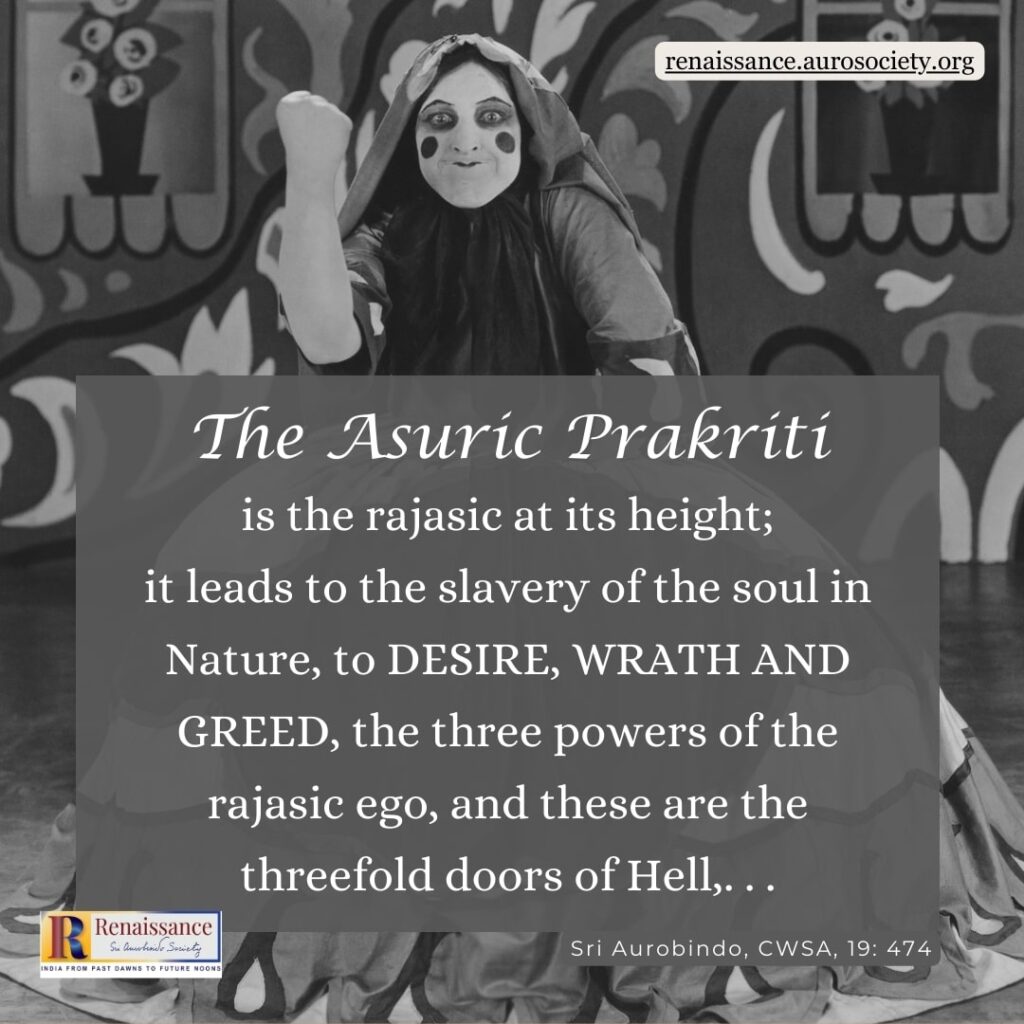
These three are again the doors of a great darkness, they fold back into Tamas, the characteristic power of the original Ignorance; for the unbridled force of the rajasic nature, when exhausted, falls back into the weakness, collapse, darkness, incapacity of the worst tamasic soul-status.
To escape from this downfall one must get rid of these three evil forces and turn to the light of the sattwic quality, live by the right, in the true relations, according to the Truth and the Law; then one follows one’s own higher good and arrives at the highest soul-status.

~ Design: Beloo Mehra

